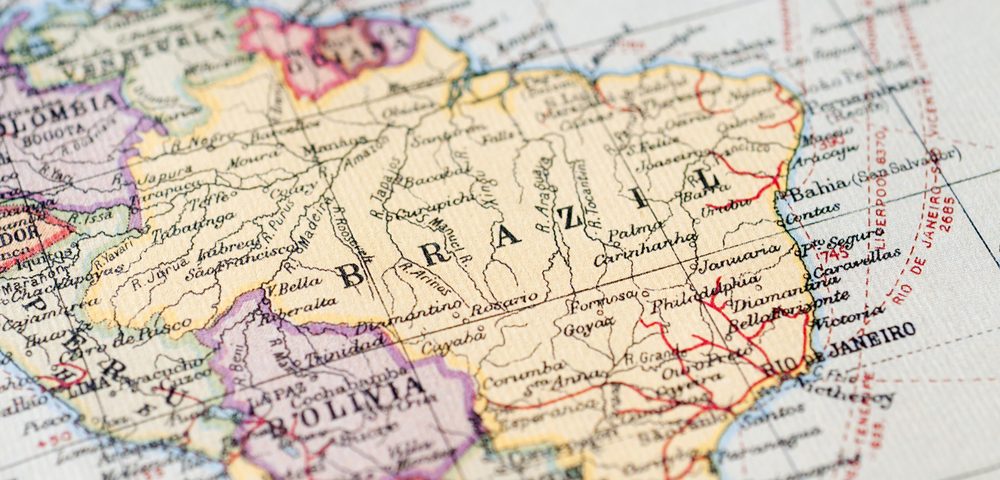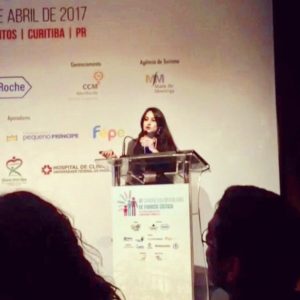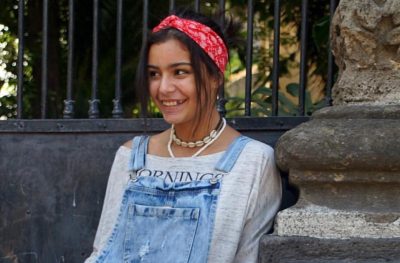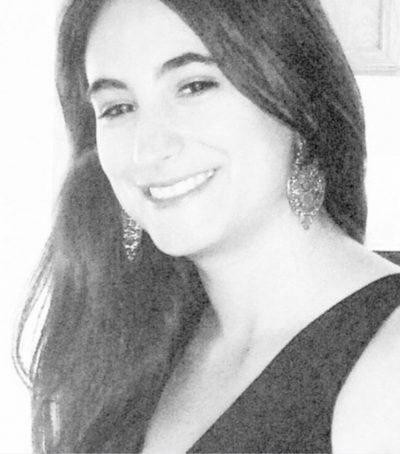Cystic Fibrosis Care in Mexico and Brazil: Two Interviews

For the first part of this series, I interviewed two women from two different countries in Latin America. Regina Rodríguez is 18 and from Mexico City, Mexico. Miriam Figueira, from Rio de Janeiro, Brazil, is a 30-year-old doing post-doctoral CF research at The University of North Carolina, Chapel Hill.
My interviews unfolded into conversations about their unique experiences with CF and the paths they’ve created for themselves. We also unraveled what it’s like to have such a demanding disease in Latin America.
Diagnosis stories often vary in age, circumstances, and impending issues. The universal experience is that something is wrong.
Regina: “Well, I was born with a problem called peritonitis meconial. That basically means that your intestines explode. And well, when that happened to me, they thought it was a different illness. They let me go home, but they noticed I kept losing more and more weight. And, they decided to go to a CF specialist, really to discard the possibility of CF …”
Miriam: “In Brazil, it’s underdiagnosed. CF is not very known… But, what brought me to diagnosis at 13 was that I started to lose weight close to puberty. Since I needed more fat, it was hard on me. I asked my mom if she could take me to the doctor, and we went to my pediatrician. And [my pediatrician] was like, “You need higher fat and calorie nutrition.” He noticed I was coughing more and sent me [home] on antibiotics. I did an X-ray before and after the antibiotics. The radiologist noticed that even with antibiotics, I was not better … that it was something chronic. He finally suggested that I have CF.”
I wondered what their post-diagnosis experiences with their care teams and clinics were like. Miriam, having been a patient in both Brazil and the United States, offers a stark contrast.
Regina: “I don’t think [Mexico] is as cool [as the United States]. Of course, we have a pulmonologist, a psychologist, and a nutritionist. But, it’s not like, “Yes! There’s a team of five nutritionists, five pulmonologists, etc.” Because no, life doesn’t give that … And so, I go to consultations [clinic] every three months, and they do lung function tests …”
Miriam: “In Brazil, the main problem is the infrastructure, like waiting times or poor and consistent access to medications. For adults, it’s harder to get doctors who specialize in CF. Just recently, they built a community for adults. It’s public. All of that is different from here in the U.S. Back in Brazil, I had a private doctor through my health insurance — not everyone there has health insurance — but the private doctors, very few are specialized in CF, especially in adult care. Yeah, doctors [in Brazil] are getting more experience now with older patients, but in the U.S., the care it’s more well-established and they have more experience.”
I noticed through our conversation that access to medicines was not only difficult but it that there was at least a shortage or limited supply — particularly for antibiotics. It’s important to note, as this is neither of our expertise, that these are just experiences.
Regina: From what I’ve experienced, it’s very difficult to get medicines that are really expensive. My mom had that box of Tobramycin for a while. We had it and saved it for a while, just in case of emergency, because it’s difficult [to get the medicine]. I honestly don’t know exactly [the process] … Once I went to the insurance and asked for 21 boxes [of enzymes]. And they gave me 10 of Creon and 10 of something similar, but that doesn’t work. You know?
Miriam: For example, vitamins — we have problems. One company stopped selling vitamins in Brazil. So we basically don’t have it over there. A lot of times what people do is go abroad and buy it.
Miriam noted an experience in which she became resistant to Tobi, and Cayston became her only option, which ensued in a legal battle to make sure she got the medicine:
Cayston is not available in Brazil, at all. It’s not approved by our agency — the company did not want to sell in Brazil as there were not enough people. There’s a law that you have a right to live (in Brazil) … you have to provide the medicines that are good for you and crucial to the patient’s health. And that’s what I did — I filed the lawsuit and I won! But, that was very stressful. I was able to have the drug, but every six months, I had to go through the process again.”
On CF awareness:
Regina: Here in Mexico, with this disease, we’re super behind in the sense that people just don’t know [about it]. You know? I have a YouTube channel that is dedicated to CF [awareness].
Miriam: People just don’t know about CF [in Brazil]. Here, in the U.S., people are much more aware.
Spanish original transcript
Para la primera parte de esta serie, entreviste a dos mujeres de diferentes países de América Latina. Regina Rodríguez, tiene 18 años y es de Ciudad de México, México. Miriam Figueira, tiene 30 años y es de Río de Janeiro, Brasil, y actualmente está haciendo un trabajo de inverstigacion de pos doctorado en FQ en University of North Carolina, Chapel Hill.
Mis entrevistas se desarrollaron en conversaciones sobre sus propias experiencias con FQ y lo que han tenido que hacer por ellas mismas, para descifrar lo que es tener una enfermedad exigente en cada uno de sus países.
La historias de los diagnósticos a menudo varían de acuerdo a la edad, las circunstancias y los inminentes problemas. La experiencia universal es que algo no está bien.
Regina: “Bueno, cuando nací, lo hice con un problema llamado Peritonitis Meconial. Lo que básicamente significa que tu intestino explota, y bueno, cuando eso me paso ellos pensaron que era otra enfermedad. Me dejaron ir a casa, pero notaron que seguía perdiendo mas y mas peso, fue cuando decidieron ir con un especialista en FQ, realmente para descartar la posibilidad de FQ…”
Miriam: “En Brasil, está subdiagnosticado. La FQ no es muy conocida… Pero, lo que hizo que me diagnosticaron a los 13 años, fue que empecé a perder peso, cerca de la pubertad . Como necesitaba ingerir más grasa en mi dieta, fue duro para mi. Le pedí a mi mama si podría llevarme al doctor, entonces fuimos a mi pediatra y el (mi pediatra) me dijo “Necesitas un mayor consumo de grasa y calorías en tu alimentación.” Y noto que estaba tosiendo mucho y me envió antibióticos para tomar en casa y que regresara luego del tratamiento. Me hicieron unos rayos X antes y después del tratamiento. El radiólogo noto que a pesar de los antibióticos yo no estaba mejorando…y fue cuando sospechó que tenía una enfermedad crónica y finalmente sugirió que era FQ.”
A partir de sus diagnósticos, me pregunte como eran sus experiencias con sus equipos médicos y clínicas. Miriam, me dio ambas perspectivas la primera de ser paciente en Brasil, pero también la de estar viviendo acá en E.E.U.U., mostrandome un contraste de ambos países
Regina: “Creo que acá [Mexico] no es tan cool [como Los Estados Unidos]. Por supuesto tenemos un neumonologo, un psicólogo y un nutricionista. Pero, porque no es como “Si, tenemos un equipo de 5 nutricionistas, 5 neumonólogos, y otros.” Porque no, la vida no da eso… y entonces yo voy a consultas (clínicas) cada tres meses, y ellos me hacen pruebas de la función de mis pulmones…”
Miriam: “En Brasil, el principal problema es la infraestructura, así como los tiempos de espera o el acceso deficiente a los medicamentos. Para adultos, es mucho más difícil conseguir doctores especializados en FQ. Recientemente, construyeron una comunidad para adultos. Es publica. Todo es muy diferente acá en los Estados Unidos. En Brasil, tenía un doctor privado por mi seguro de salud — no todo el mundo tiene acceso a seguros de salud — de los doctores privados son muy pocos los que tienen una especialización en FQ, especialmente en cuidados para los adultos. Si, los medicos [en Brasil] están adquiriendo más experiencia ahora con pacientes adultos. En los Estados Unidos, los cuidados están más definidos y tienen experiencia por mucho más tiempo”
Sobre el acceso a los medicamentos: Según la conversación fue tomando forma, note que el acceso a las medicinas no solo era difícil, parece que ellos tiene poco o limitado abastecimiento de las mismas — especificamente de antibioticos. Es importante hacer notar que ninguna de nosotras somos expertas, es solo una conclusión por nuestras experiencias
Regina: Desde mi experiencia, es muy dificil, bueno, es difícil tener acceso a medicinas que son realmente costosas. Mi mama tenia una caja de Tobramicina desde hace un tiempo. La teníamos y la cuidamos por un tiempo en caso de emergencia. Porque es muy difícil [obtener ese medicamento]. Honestamente desconozco exactamente [el proceso] … Una vez fui al seguro y pregunte y por 21 cajas [de enzimas]. Y me dieron 10 de Creon y 10 de algo similar, pero que no hacen el mismo efecto. Tu sabes?
Miriam: Por ejemplo, vitaminas — tenemos problemas. Una compañía dejó de venderlas en Brasil. Entonces básicamente no disponemos de ellas allá. Muchas veces la gente lo que hace es que va al extranjero y las trae.
Miriam noto que se volvió resistente al Tobi y Cayston era su única opción, lo que ocasionó una batalla legal para poder obtener su medicina:
“Cayston no esta disponible en Brasil, para nada. No está aprobada por la agencia — la compañía no quiere venderla en Brasil porque no había suficiente mercado. Pero hay una ley que dice que tu tienes derecho a vivir (en Brasil) … y tienen que proveerte de las medicinas que son buenas para ti y que son cruciales para la salud del paciente. Y eso fue lo que hice — presente la demanda y gane! Pero, eso fue muy estresante. Pude tener acceso a la droga, pero cada 6 meses tenia que pasar por el proceso nuevamente …”
Regina: Aca en Mexico con esta enfermedad, estamos super atrasados en el sentido que la gente simplemente no sabe. Sabes? Yo por ejemplo … Yo tengo un Canal en Youtube, que es dedicado a la FQ.
Miriam: La gente simplemente no sabe nada de FQ [en Brasil]. En los E.E.U.U. las personas están mucho más conscientes.
***
Note: Cystic Fibrosis News Today is strictly a news and information website about the disease. It does not provide medical advice, diagnosis, or treatment. This content is not intended to be a substitute for professional medical advice, diagnosis, or treatment. Always seek the advice of your physician or other qualified health provider with any questions you may have regarding a medical condition. Never disregard professional medical advice or delay in seeking it because of something you have read on this website. The opinions expressed in this column are not those of Cystic Fibrosis News Today, or its parent company, Bionews Services, and are intended to spark discussion about issues pertaining to cystic fibrosis.










